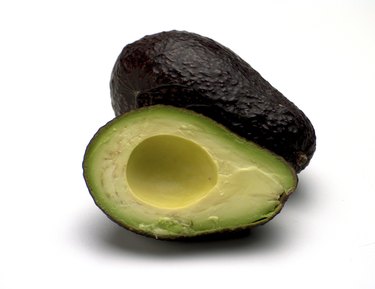
Avocados are found in many produce departments across the United States, but the majority of this crop is grown in California. If you happen to drive by an avocado farm and see the massive trees, not only are you a witness to the natural growth of the fruit, but there is a lot of symbolism that comes along with it and dates back to ancient times.
The Alligator Fruit
Video of the Day
Unlike the smooth body of an apple or the fuzzy body of a peach, the avocado fruit has a rough, scaly texture that forms during its growth on a tree. This rough skin has led to the avocado's common nickname of "alligator pear" and is symbolic of the fruit's comparisons to hanging pears and the reptilian skin the avocado duplicates. The name is rarely used in marketing because of its "dangerous" appeal that does not focus on the oily, fleshy fruit contained on the inside.
Video of the Day
Aztec Symbolism
Long before avocado was widespread, the fruit was named "ahacatl" by the Aztecs. This name translates to testicles and often refers to the hanging shape featured on the avocado tree. The fruit grows in pairs, which helps explain the "ahacatl" name even more. The name is still used today in some cultures.
Love
The pairs of avocados not only translate to "ahacatl," but can be a symbol for love. A pair of avocados represents each person in a couple, living and growing together on a tree. The avocado tree lives for hundreds of years, keeping their love alive as long as the tree is growing. In Colombia, a man often picked two avocados and gave one to his wife as an outward display of love for his partner.
Aphrodisiac
Along with the love symbolism associated with the avocado, the fruit and the tree itself were often seen as a natural aphrodisiac. This became so widespread that the notion was used in ad campaigns to help spread the use of avocados in the early 1990s, with the idea being that even just seeing the tree and being around it was also an aphrodisiac for viewers and couples surrounded by the natural force of nature.